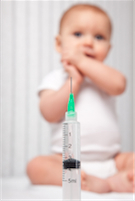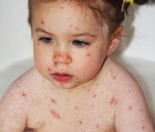Measles is a highly infectious childhood disease characterised by a rash and fever. We provide helpful articles and advice about the signs and symptoms, treatments, risks and complications of measles here.
What causes measles?
Measles was once a common childhood infection caused by virus of the paramyxovirus group. It is characterised by spots and a respiratory infection causing high fever, cough and runny nose. It is very contagious – nine out of 10 children exposed to the virus will develop measles.
This article explains the signs and symptoms of the disease and how it is treated as well as vital information on what you can do to help your child with measles.
Measles is now considered a serious disease because of possible complications, including encephalitis in 1 in 1000 cases (inflammation of the lining of the brain) and pneumonia (lung infection). A vaccination against measles is available in New Zealand as part of the MMR Measles Mumps Rubella vaccine given at 15 months and four years. Check the possible side effects of the vaccine in the Immunization Schedule for all children in NZ.
Babies generally have a natural immunity to measles for the first six to eight months of their life, due to immunity passed on from their mother.
The incubation period (the time from first exposure to the virus until symptoms develop) is 1-2 weeks and a dose of measles will last 8-10 days. Measles is contagious from when the cold symptoms first start. Once your child has recovered from measles they are likely to have lifelong immunity from the illness.
What are the signs and symptoms of measles?
Measles begins with the symptoms of a cold:
- Headache
- Fever
- Runny nose
- Dry cough
- Watery, red, sore, puffy eyes
- Sensitivity to light
The rash begins on the 4th or 5th day following the symptoms above and may appear as follows:
- A raised, red rash starts behind the ears or on the forehead and spreads to rest of face and body
- Spots and blisters on hands and feet
- Spots in the mouth that may make it difficult to eat
- Koplik spots (tiny white spots inside the cheeks).
What is the treatment for Measles?
See your doctor, to confirm the diagnosis and have the child checked over.
Measles is caused by a virus, so antibiotics will not be effective.
Treatment is aimed at lessening the symptoms (see ‘What Can I do?’ below).
Contact your doctor again if your child develops bad earache, seems short of breath, is coughing up green or yellow mucous, seems to be getting worse or shows more serious signs (high fever, neck stiffness, extreme tiredness, unsteadiness, vomiting, loss of coordination).
Risks & complications of measles
Otitis media (infection of the middle ear) and pneumonia.
In 1 in 1000 cases encephalitis – which at worst can cause brain damage or even death.
There is also a small risk of seizures.
What can I do for my child with measles?
- Keep your child in bed and as comfortable as possible
- A darkened room might help with light sensitivity
- Give your child plenty of fluids and soft foods
- Cough mixture may help
- Cough may also be lessened by using a vapouriser, or sitting with your child in a steamy bathroom
- Paracetamol can be given to reduce fever- follow the instructions on the bottle for age and correct dosage
- Eyes can be bathed if necessary, using cooled boiled water and clean cotton swabs- start at the centre of the eye, sweep outwards, using each swab only once.
- Measles is highly contagious so keep your child at home
Useful articles
Our Kiwi Families Immunisation section has information on where to go for immunisations, what to expect, the New Zealand recommended immunisation schedule and information on the pros and cons of immunisation for your children.








